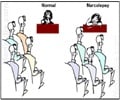Inspire Medical System is to launch its Stimulation Therapy for Apnea Reduction trial to assess the safety and effectiveness of Inspire Upper Airway Stimulation (UAS) therapy for the problem.

More than 12 million Americans have obstructive sleep apnea, according to the U.S. National Institutes of Health. It's particularly common in people who are overweight and in middle-aged men, but anyone can have it. According to the 2009 Canadian Community Health Survey, 26 per cent of Canadian adults had a high risk of having obstructive sleep apnea.
Today's undisputed best treatment, called CPAP, uses special bedtime masks to gently blow air through the nose to keep airways open. But studies suggest at least 30 per cent of diagnosed apnea patients won't or can't use CPAP. They cite masks that fit poorly and leak, or say they feel claustrophobic, or rip them off while tossing and turning during the night.
Yet going untreated is more dangerous than just feeling tired. Sleep apnea stresses the body in ways that increase the risk of high blood pressure, heart attack, stroke and diabetes. More immediately, severe apnea increases the chance of a car crash sevenfold.
Last year, the U.S. National Transportation Safety Board recommended that pilots, truck drivers and other commercial transportation operators start being screened for apnea, saying it has been a factor in incidents involving every mode of transit.
Surgeons sometimes try removing part of the roof of the mouth or other soft tissues to treat apnea by widening airways. But it's hard to predict when these difficult operations will help, so they're usually reserved for the most severe cases.
Advertisement
Professor Paul Van de Heyning, Director of Otolaryngology and Head and Neck Surgery at the University of Antwerp in Antwerp Belgium recently implanted the first patient in the STAR trial. "Inspire's stimulation therapy is well suited to address the root cause of OSA for many patients which is a decrease in airway muscle tone during sleep," said Professor Van de Heyning. "The Inspire implant procedure is less invasive than most OSA surgical techniques which will likely contribute to faster patient recovery times. The STAR trial will provide valuable information on the potential role of upper airway stimulation therapy."
Advertisement
"Patients with untreated sleep apnea are at higher risk of developing hypertension, heart failure and stroke," said Dr. Meir Kryger, Director of Sleep Medicine Research and Education at Gaylord Hospital in New Haven, Connecticut. "There is a growing need for new treatment options for those patients who are non-compliant with current therapies."
"OSA is a prevalent disorder affecting over 15 million adults in the U.S. alone. Current front line therapies for OSA, including CPAP, can have a significant impact on the lifestyle and comfort for both the OSA patient and their bed partner. As a result, patient compliance for these front line therapies is sub-optimal. A substantial number of patients suffering from OSA are looking for a new approach to treat this challenging condition," commented Tim Herbert, President and CEO of Inspire Medical Systems. "Our goal with Inspire therapy is to significantly reduce the burden of sleep apnea and restore restful sleep without the lifestyle tradeoffs that some other therapies require."
Two competitors are developing similar implants: ImThera Medical of San Diego says it hopes to begin U.S. studies later next year, and Apnex Medical of St. Paul, Minn., has announced some small-scale testing.
Source-Medindia














